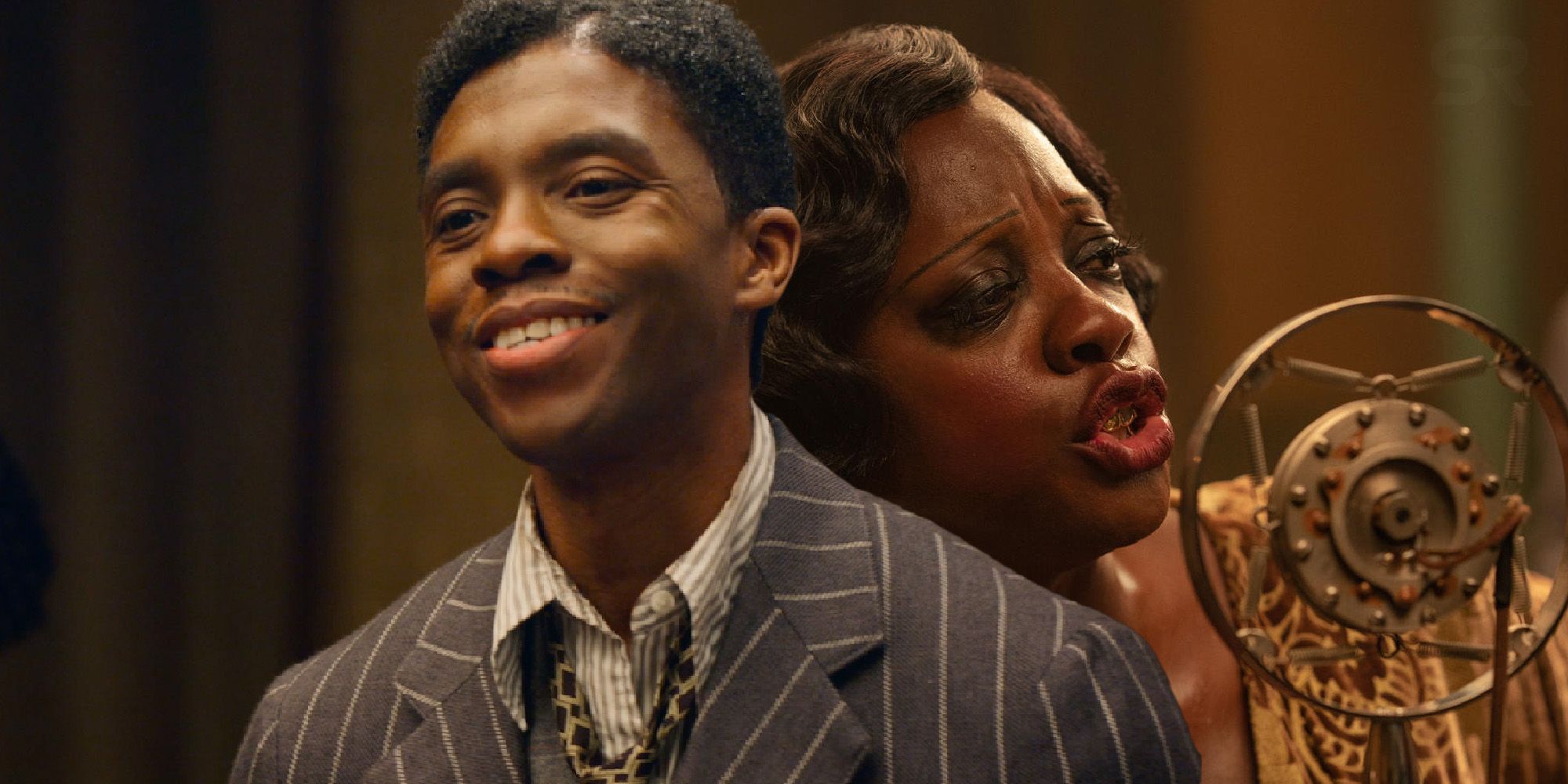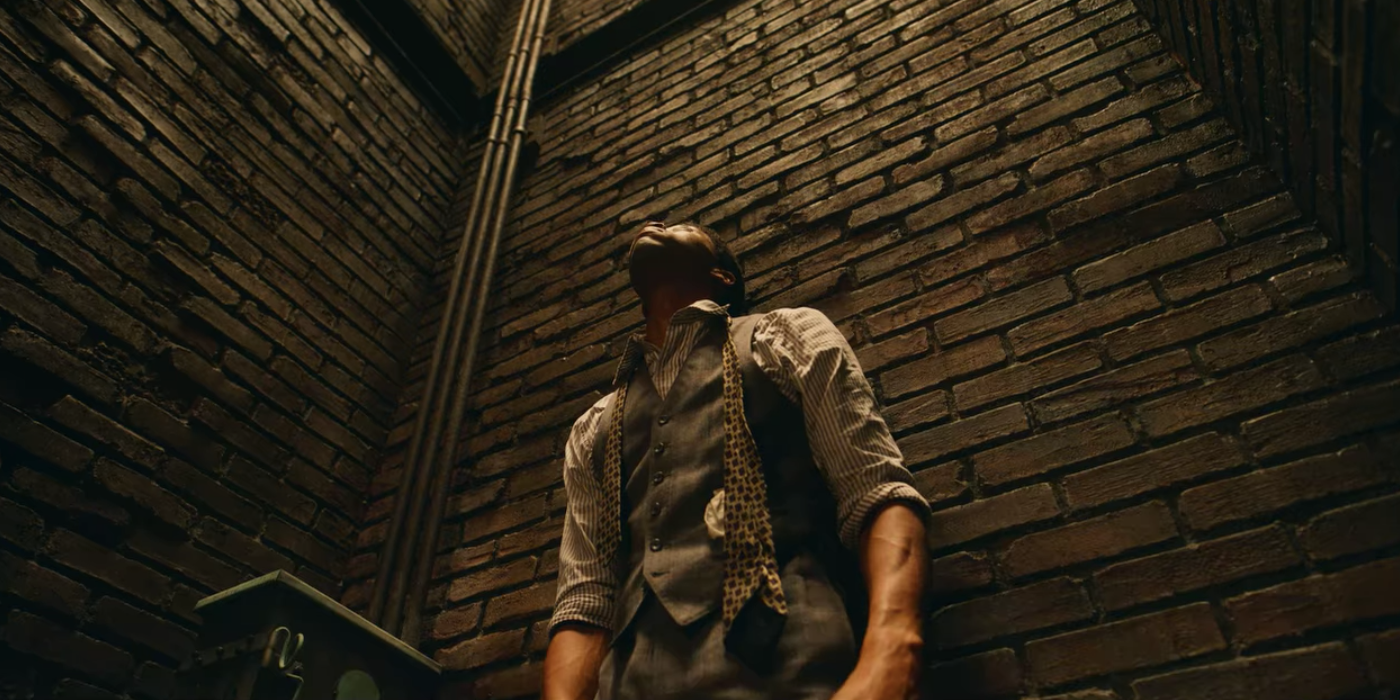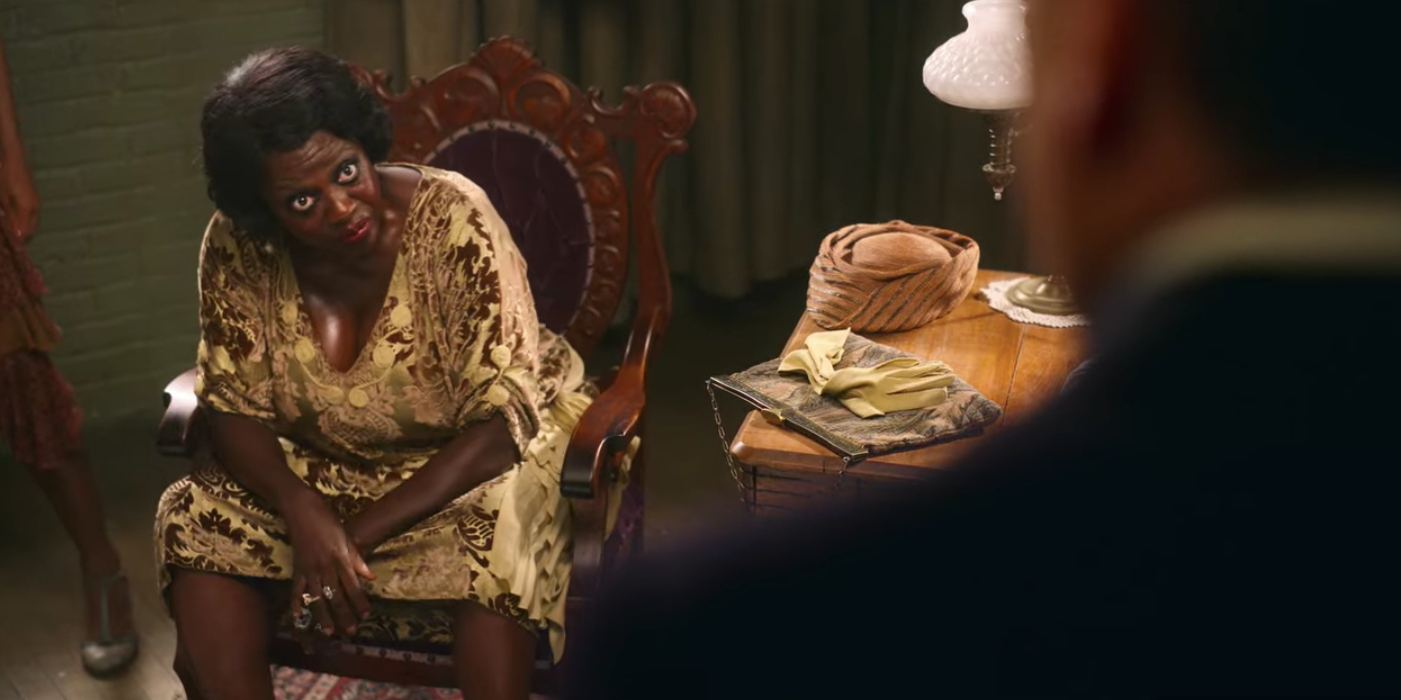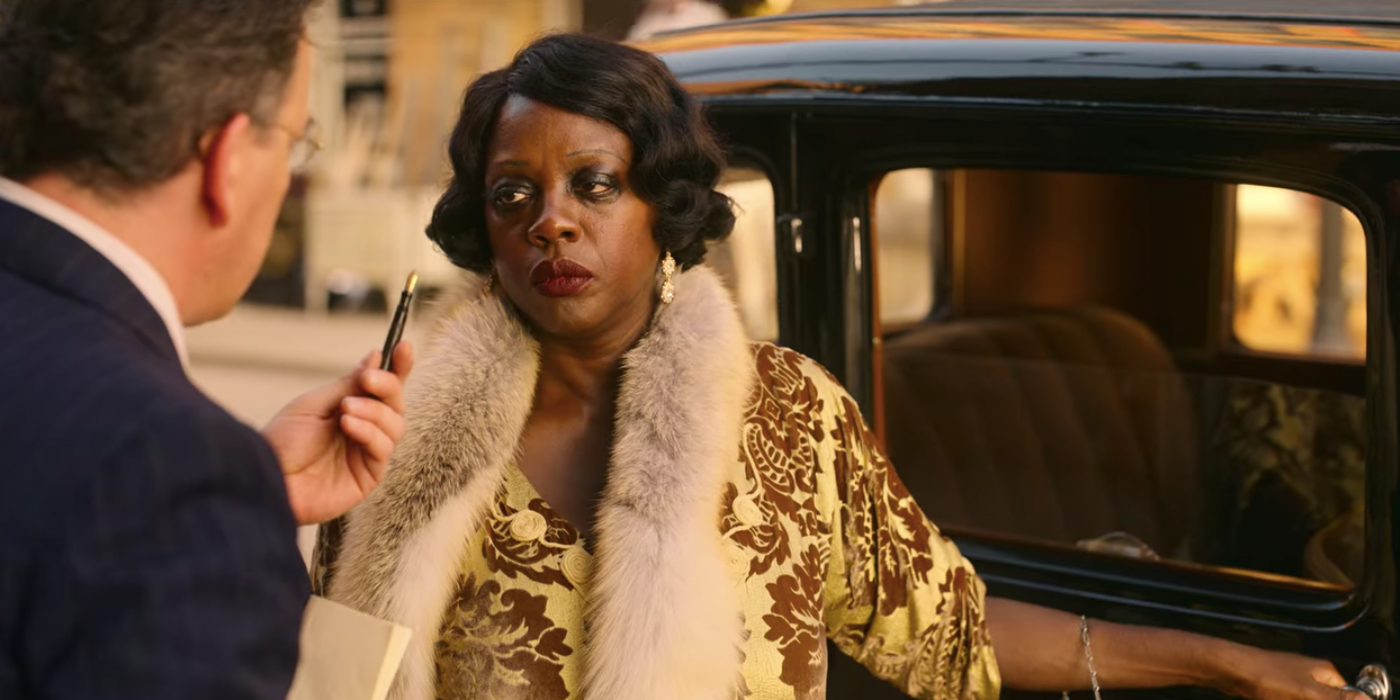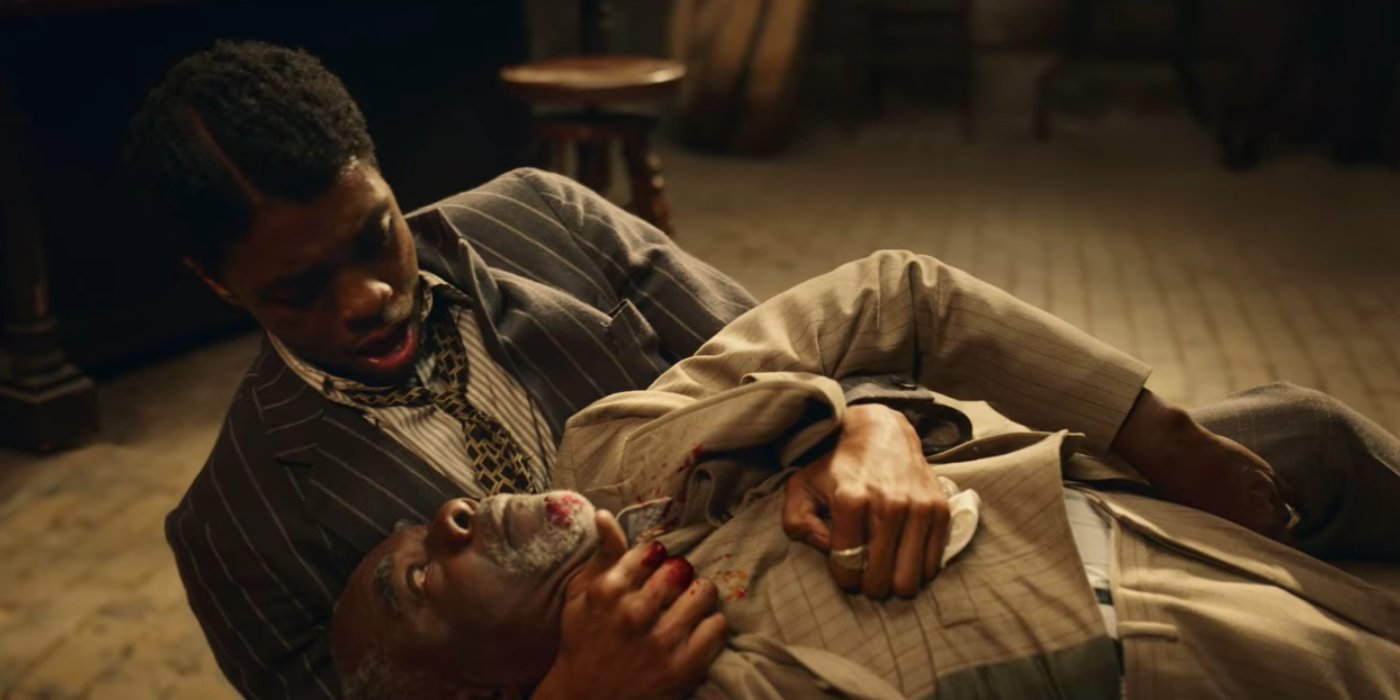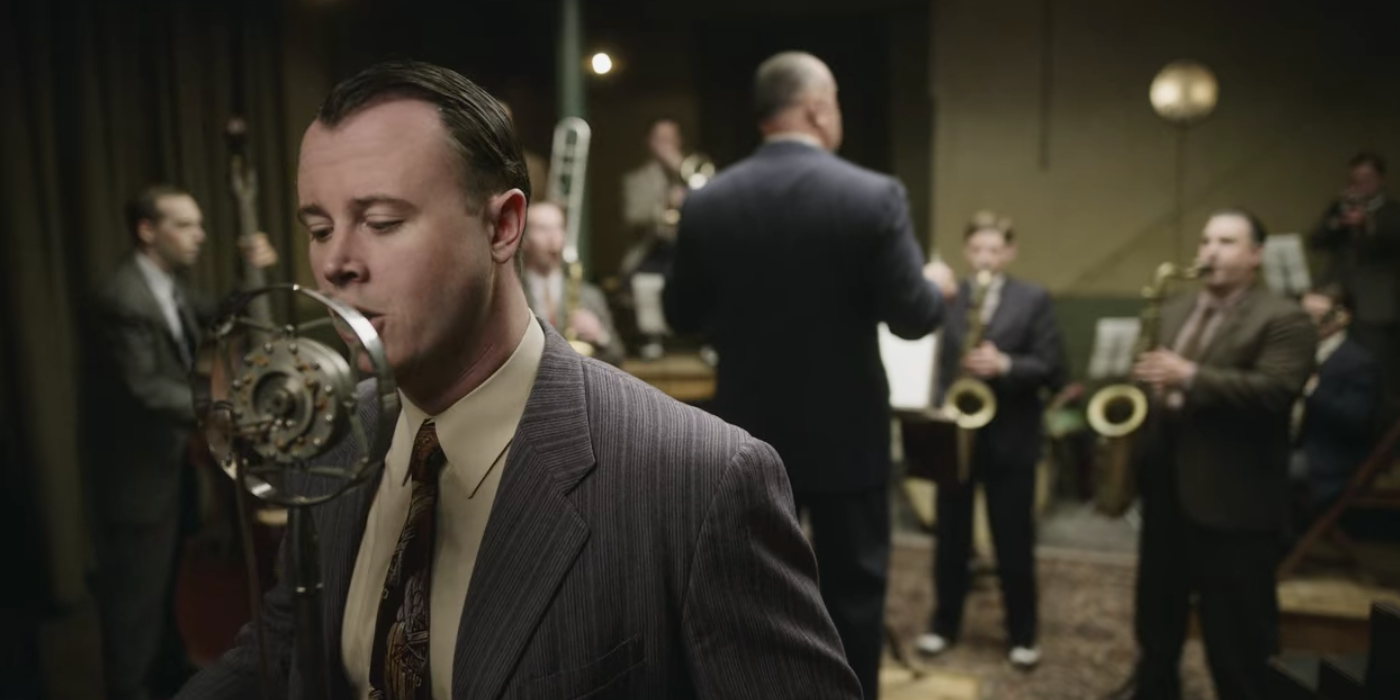Netflix released Ma Rainey's Black Bottom on December 18, 2020, bringing with it incredibly moving performances and an ending that continues to haunt long after the credits roll. The Netflix film is an updated version of August Wilson's play of the same name, taking place on a hot summer day in 1920s Chicago while Ma Rainey and her band take part in an afternoon recording session. In Ma Rainey's mere ninety minute runtime, the film effectively and efficiently investigates some weighty subject matter, including America's troubled history with racism and inequality, as well as the transactional nature of talent and power.
Expertly directed by George C. Wolfe and adapted by writer Ruben Santiago-Hudson, the action is consistently compelling, creating a sweltering atmosphere that only helps to augment the oppressive claustrophobia felt by the characters. The cast is led by the stellar Viola Davis as the tough-as-nails titular blues singer and the late Chadwick Boseman as Levee, a young and ambitious trumpeter. Even from a long-list of excellent performances, Leeve many just be the best Boseman has ever turned in, and the tragedy of Levee — heartbreaking enough on its own — is only heightened with the knowledge that the actor's final on-screen role was so thoughtfully and beautifully rendered.
Yet, Boseman's portrayal is just one of many reasons that Ma Rainey's final act is so impactful. The film's climax comes with Ma Rainey's decision to fire Levee and, from that moment on, Wolfe carefully ratchets up the tension, taking time to track each of the characters as they negotiate the ways in which the day has affected and changed them. Here's our explanation of the film's final beats as things begin to spiral out of control.
The Door To Nowhere
After being fired by the blues-singing diva, Levee storms off to the band's rehearsal room, angrily removing his jacket and roughly shoving his beloved trumpet in its case. With his rage clearly threatening to boil over, Chadwick Boseman's character turns his gaze to a mysterious door, one which drew his attention earlier in the film. Hours before, Levee questioned whether or not it was in the room on their last visit to the recording studio and throughout the story, frequently hovers around it, pulling at the locked handle. Now enraged, the musician kicks down the door only to see that it leads to a small and empty alley.
In Ma Rainey's Black Bottom: A Legacy Brought to the Screen (Netflix's 30-minute documentary detailing the film's production), Wolfe notes that Levee's discovery of what lies beyond the door is an invention for the movie, despite its presence being lifted from Wilson's original play. "August put in there him trying to get in through that door," Wolfe notes. "But I thought, 'Let's have him, at one point, break through that door and realize that door leads to nowhere." The director confirms that the stark reality of what lies behind the door, which so preoccupies Levee throughout the proceedings, is meant to be a metaphor for the pervasive racism in America. The impact of the added scene is truly gripping, as Boseman expertly conveys the character's desperation to know what lay beyond the wood and glass, only to be greeted with an ugly sight save for the depressingly out-of-reach sky. The choice helps to literalize Levee's feelings of helplessness and claustrophobia brought on by the moment, but also by a system perpetuated by crippling inequality and racism.
Ma Rainey Negotiating Payment
An apprehensive Irvin comes before an impatient Ma Rainey, telling her that he is not sure that he will be able to secure money for her nephew, who lent his voice to a track earlier in the film. After the only solution he and producer (Mr. Sturdyvant) can reach is for Ma to deduct the money from her own pay, she glares and retorts, "If I wanted the boy to have $25 of my own money, I'd give it to him. He's supposed to have his own money. He's supposed to get paid like everyone else." After a testy exchange, in which Ma threatens to never return for another session, Irvin relents and returns to Sturdyvant to renegotiate.
The scene is significant as it highlights Rainey's protectiveness of those she cares for and advocating for black people when she sees white people attempting to take advantage of them. The ferocity of Davis' performance is, perhaps ironically, indicative of the character's underlying kindness and generosity. Despite Ma's cantankerous attitude, she ensures that all of her band members are paid for their work. Further, it's clear that her desire to have her nephew take part in a song stemmed from her desire to build his confidence, despite his stutter. In an earlier conversation, she tells Cutler of the power she holds over Irvin and Sturdyvant — both of whom desperately want to profit off of her gift — and it is clear that she is both savvy and maternal enough to use her influence to be sure that those without a voice are also taken care of.
Ma Rainey Signing the Contract
Though she may just be trying to get a rise out of him, a fuming Ma Rainey threatens Irvin that she will not sign the release forms at the end of Ma Rainey's Black Bottom, meaning the record will go undistributed and neither her manager nor the studio's executives will make any money. After being chased down to her waiting car, Ma eventually relents and quickly signs the papers. Always wishing to get in the last word, before she goes, she turns and warns Irvin, "You tell Sturdyvant, any more mistakes and I can make my records somewhere else," showcasing her legendary toughness one last time.
This conclusion of Davis' character neatly bookends an earlier scene where she makes it clear that she is aware that she is only important to men like Irvin and Sturdyvant because she can make them money. Ma Rainey's earlier promise that "they gonna treat me like I want to be treated no matter how much it hurt them” if fully realized in her final scene and her reluctance in not signing the papers may stem from her deep fears that in doing so, she will be stripped of her the power she wields over the white men who profit from her. Ma's threat that she can and will record elsewhere is a declaration of agency made to Irvin in order to remind him of her dominance. But it is also likely that she is also acting in the interest of her own self-preservation.
Levee Kills Toledo
Fired from Ma Rainey's band, the trumpet player's rage finally bubbles over after Sturdyvant (who had been promising to record Levee playing his own compositions) agrees to buy his songs for a mere five dollars each. Offended and locked into an uncertain future, Levee misplaces his anger after Toledo accidentally steps on his new shoes. In a tragically quick and abrupt turn of events, Levee stabs the old pianist in the back, looking into his eyes as he bleeds to death. Levee's final shot in Ma Rainey's Black Bottom shows him crying over Toldeo in a heartbreaking overhead tableau.
The scene packs a bit of a punch, considering Toledo's innocence and good-naturedness throughout the film. His "crime" was trodding on Levee's yellow shoes, a symbol of the trumpet player's upward mobility and his hopes in a future in which he could profit from the growing popularity of jazz music, a genre just in its infancy at this time. Notably, despite his frustrations and pain inflicted by a white-led establishment — embodied by Sturdyvant, who pays Levee off as if he is doing him some sort of favor — it is Toledo, a black man, who suffers. Levee's inevitable fate is a gripping reminder that the oppressive systems to which African Americans have historically been subjected have very real and, frequently, violent consequences.
Jelly Roll Is Performed
In a deviation from Wilson's play, which leaves Sturdyvant's motivations for buying Levee's compositions ambiguous, Wolfe choses to have a group of all-white musicians recording one of the numbers — "Jelly Roll" in Ma Rainey's Black Bottom's coda. The final scene stands in stark contrast with the drama and bloodiness surrounding the composer's predicament, shown just moments ago, making for a particularly eerie rendition. The number's stiff and still performance is also at odds with the other songs which punctuate the film, sung and played by Ma and her band, while illustrating that Levee was correct when he told Sturdyvant that he should be the one to record it.
By tinkering with Wilson's script to add the final song, Wolfe deliberately (and effectively) calls back to Ma Rainey's earlier observation that "White people don't understand nothing about blues. They hear it come out, but they don't know how it got there." However, the director goes further, illuminating a history in which the work of black artists have been "repurposed" for white people, often at the expense of the original creators. The fact that Ma Rainey's Black Bottom — a film which largely follows the experiences of hard-working and talented black musicians — ends in this way is significant and unsettling. Wolfe juxtaposes the tragedy of the man whose soul gave the song life with those who perform it now, who appear distant and unfeelingly unaware of its history.
Ma Rainey's Black Bottom may take place almost a hundred years ago, but its parallels to today's world are unmistakable and intentional. Under Wolfe's leadership, the telling of the story is impressive and hard to take one's eyes off of, particularly in the film's final minutes. In Davis' most contemplative monologue, Ma says, "The more music you have in the world, the fuller it is." The same can be said for movies like this one.

